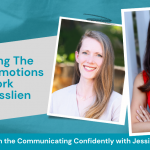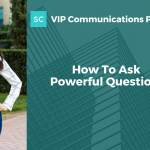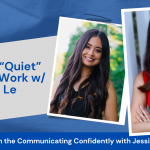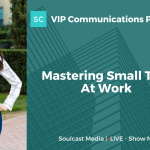Unlocking Powerful Listening For Impactful Speaking
If you want to be an effective communicator, you have to be a powerful listener. Listening will help you become an impactful speaker because others will feel like they are being heard. Once that happens, you will have effectively gained their attention. While many of us are likely great listeners already, there are more things we can do to show we are attentive and we care. It is subtle, strategic and and incredibly powerful.
 Our CEO and Founder, Jessica Chen, recently hosted a Soulcast Media | LIVE event on LinkedIn where she interviewed author, and psychotherapist, Nixaly Leonardo.
Our CEO and Founder, Jessica Chen, recently hosted a Soulcast Media | LIVE event on LinkedIn where she interviewed author, and psychotherapist, Nixaly Leonardo.
They shared key tips and personal experiences on how to be a powerful listener and why listening is so important. This Soulcast Media | LIVE event is brought to you by our amazing sponsors at NeedThat™
NeedThat™ is a modern independent publishing company that wants to cut through the noise of everyday consumerism.
The best products are the ones that are referred to us by our friends and family, people who we can trust. NeedThat is connecting our readers to make smarter and informed purchasing decisions.
Listening, just like communicating, is a skill you can learn and improve upon. Unlocking powerful listening for impactful speaking takes effort. But by applying a few key strategies will help elevate your communication ability.
1. Active Listening vs Passive Listening
Active listening involves careful listening which includes paying attention to non-verbal cues and thoughtful responses. On the other hand, passive listening is when someone listens without responding, often not providing any feedback. We all know when we are being listened to and when we are not.
When you actively listen to someone you are listening AND responding in a way that allows both parties to have a mutual understanding.
So how can you practice active listening techniques? During the Soulcast Media | LIVE, Nixaly touched on one of the biggest aspects of active listening – acknowledgment.
By acknowledging what the other person is saying, it shows you are actively listening. When a person feels like they are being listened to, are more likely to be open. There will be fewer roadblocks within the communication.
Ways to acknowledge:
- Paraphrasing – You can do this by putting what they said into your own words. For example, you could say, what I think I heard you say was…
- Open To Being Wrong – Your paraphrasing may not be correct. If you are actively listening you must be open to the idea that you got it wrong too, and allow the other person to correct you.
During the Soulcast Media | LIVE someone asked the question, how do you effectively listen while multi-tasking?
 The simple answer is that you can’t.
The simple answer is that you can’t.
It’s important that you pause whatever you are doing so that you can listen. Jessica pointed out that part of being a good listener is setting people’s expectations.
Setting People’s Exepectation
If you are in the middle of a task and someone approaches to start a conversation, you may say, okay, okay okay, and try to show that you are listening, but in reality, you aren’t at all.
What you can do is to utilize body language cues, for example, shifting your body to face them. Then you can say, “I really want to hear you out on this, but I’m right in the middle of finishing this task. Can we connect at 3:00pm today so that I can listen and fully engage with what you need to say?”
You are not only acknowledging the person by turning towards them and pausing your task, but you are also setting their expectations. You give yourself an opportunity to listen when you can give your full attention.
When you make other people feel heard via active listening, they will be more receptive to what you have to say as well.
2. finding the right Time And Place
In order to actively listen, you have to be free from distraction and be able to give your full attention. This means choosing the right time and place for the conversation to take place.
During the Soulcast Media | LIVE, Nixaly talked about what to do at work if someone is trying to speak to you, but you aren’t able to actively listen.
If you are rushing through to get a project done at work and someone is trying to communicate something of importance to you, you aren’t going to be able to listen to them. Choosing a better time and place will help you listen to their message. Think about how you would respond in a way that would acknowledge them but set up a better time and place.
For example, you could say:
Option #1 – I can’t I’m busy.
Option #2 – I really want to hear you out on this, this is super important to me but I have this deadline that I have to meet. If it’s okay with you, can I get back to you after I’m finished?
You can see that in the first option, there was no acknowledgment of the other person. By not acknowledging the importance of the person and their message, you may shut them down, or feel like you don’t care.
In the second option, you acknowledge the importance of their message, but also inform them that you aren’t able to actively listen at this time. By doing so the other person will feel like you want to hear them when you are able.
 Choosing the right place to have the conversation is also important.
Choosing the right place to have the conversation is also important.
For example, having a serious conversation about performance should be done in a one-on-one setting rather than at the lunch table where other people can overhear.
When you choose the appropriate place to have the conversation, the person speaking will feel like you care about what they are saying.
As you work on becoming a more active listener, pay close attention to where and when you have important conversations.
3. Virtual Listening
During the Soulcast Media | LIVE, a question came in asking about differences between listening virtually and in-person.
Tips for active listening in a virtual environment:
- Adjust your camera to show people as much of yourself as you can. When in a virtual setting it can be hard to see someone’s body language. And body language is a big part of active listening. So if people can tell from your body language that you are listening to them, they will feel heard and acknowledged.
- Keep your camera on – When your camera is off, it immediately sends a signal that you aren’t listening.
- Getting Dressed – It may not seem like a big deal as you are able to listen in any clothes that you wear. But if you dress as you would going to the office, it will help you get into the mindset of your work self.
- Use more intonation – if you are monotoned, people will lose interest, even more so in virtual communications.
- Bring more energy – During the Soulcast Media | LIVE, a comment came in that was a tip for virtual communications that Jessica shared. “The camera sucks up a lot of energy so it’s important you bring up your energy level. Otherwise, you’ll appear disengaged and boring.”
It may take a little more effort to make sure you are actively listening while on video. But small changes can make a world of a difference in your virtual executive presence and communications confidence.
4. Listening Tips
During the Soulcast Media | LIVE, Jessica asked Nixaly if she had any listening tips to share.
- Real People – When you communicate, you are speaking with people (not robots!) These are real people who have real emotions. Use good judgment and high emotional intelligence when engaging.
- Present – It is important to be fully present. If you aren’t fully present, you won’t be able to acknowledge the other person or respond in a way that shows you were listening.
- Write things down – Oftentimes, we write something down that the other person said. Which is great! But you can also write down something that you wanted to say. This allows the other person to finish their thoughts without being interrupted, and you are also able to share yours without forgetting.
Listening is a skill that you can improve upon if you put in a little effort. Remember, the key to listening is to be an active listener. Make sure you are acknowledging the speaker and keeping your full attention on them. Unlocking powerful listening for impactful speaking will set you up for career success.
If you would like to see the full LIVE version of Jessica and Nixaly’s conversation, check out Jessica’s Youtube Channel.
__
Whenever you’re ready, there are 3 ways we can help you:
- Discover your communications style so you know where to start. Over 4,000 people have found theirs here.
- Attend our monthly communication workshop to build communications confidence (new topics: public speaking, advocating for yourself, building credibility, etc) here.
- Get your brand in front of 43k+ people by sponsoring our newsletter or Soulcast Media | LIVE LinkedIn events [contact: hello@soulcastmedia.com]











